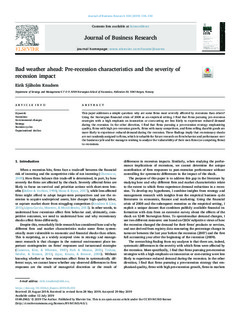| dc.contributor.author | Knudsen, Eirik Sjåholm | |
| dc.date.accessioned | 2019-09-26T07:57:50Z | |
| dc.date.available | 2019-09-26T07:57:50Z | |
| dc.date.created | 2019-08-08T14:18:40Z | |
| dc.date.issued | 2019 | |
| dc.identifier.citation | Journal of Business Research. 2019, 104 118-130. | |
| dc.identifier.issn | 0148-2963 | |
| dc.identifier.uri | http://hdl.handle.net/11250/2618875 | |
| dc.description.abstract | This paper addresses a simple question: why are some firms more severely affected by recessions than others? Using the Norwegian financial crisis of 2008 as an empirical setting, I find that firms pursuing pre-recession strategies with a high emphasis on innovation or cost-cutting are less likely to experience reduced demand during the recession. In the other direction, I find that firms pursuing a pre-recession strategy emphasizing quality, firms with high pre-recession growth, firms with many competitors, and firms selling durable goods are more likely to experience reduced demand during the recession. These findings imply that recessionary shocks are not randomly assigned to firms, which is valuable for future research on firm behavior and performance over the business cycle and for managers wishing to analyze the vulnerability of their own firms (or competing firms) to recessions. | |
| dc.description.abstract | Bad weather ahead: Pre-recession characteristics and the severity of recession impact | |
| dc.language.iso | eng | |
| dc.title | Bad weather ahead: Pre-recession characteristics and the severity of recession impact | |
| dc.type | Peer reviewed | |
| dc.type | Journal article | |
| dc.description.version | publishedVersion | |
| dc.source.pagenumber | 118-130 | |
| dc.source.volume | 104 | |
| dc.source.journal | Journal of Business Research | |
| dc.identifier.doi | 10.1016/j.jbusres.2019.05.031 | |
| dc.identifier.cristin | 1714880 | |
| cristin.unitcode | 191,20,0,0 | |
| cristin.unitname | Institutt for strategi og ledelse | |
| cristin.ispublished | true | |
| cristin.fulltext | original | |
| cristin.qualitycode | 2 | |
